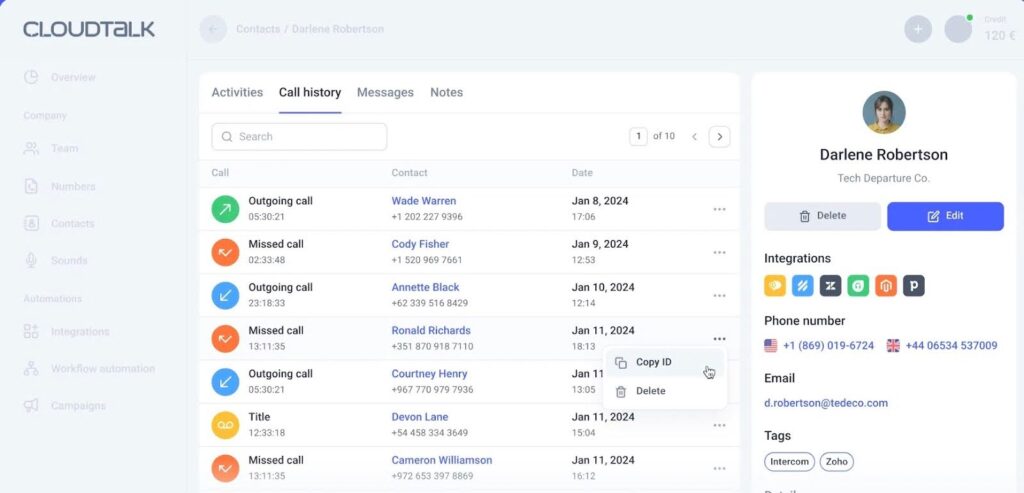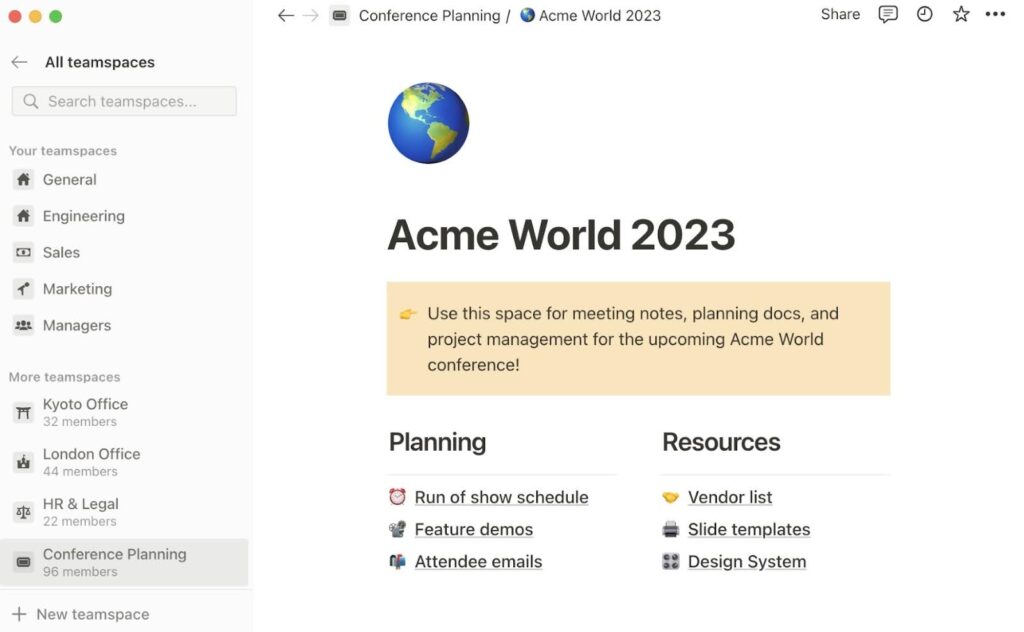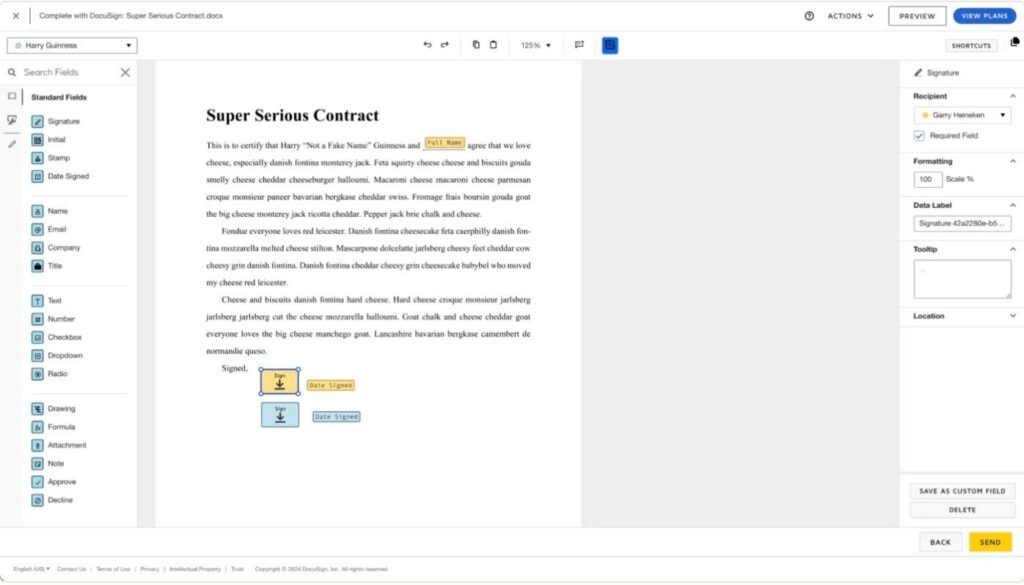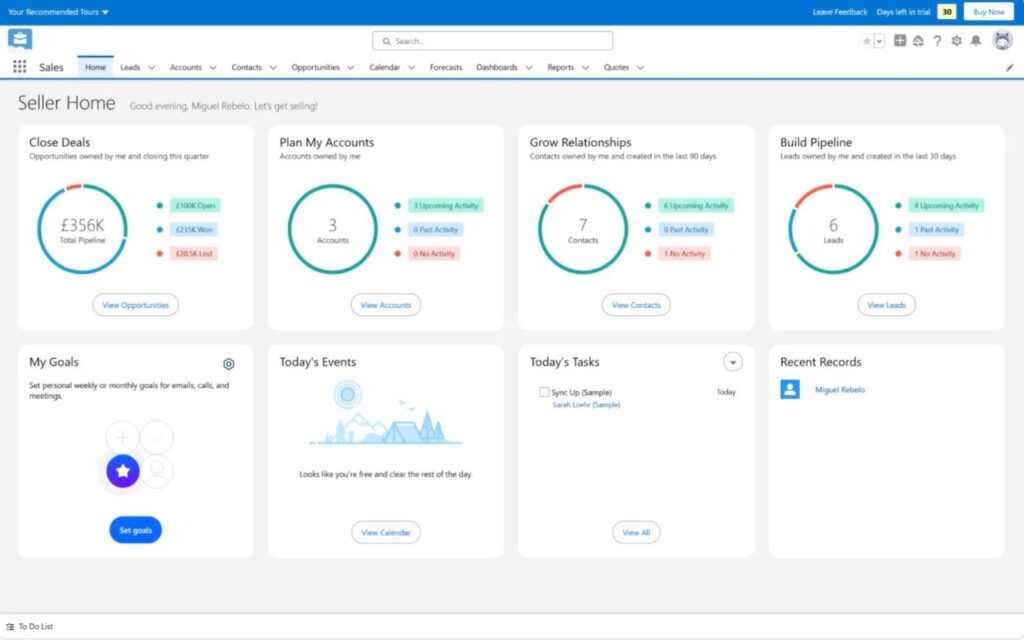8 Best Sales Software Tools of 2025

Companies of all sizes need the best product, a great marketing strategy, and the right message across all channels for potential customers to notice you.
Sometimes, however, even that might prove insufficient. Studies reveal 60% of customers say ‘no’ four times before saying ‘yes’, while cold calls have a 2% success rate*. Luckily, sales software tools can help you manage your client base, keep everything organized, and reach more clients.
There’s a wide variety of sales tools to choose from. Whether you need help with productivity, sales automation, communication, or prospecting, there’s a tool out there for your needs.
In this article, we look at the eight best sales software tools, discussing how they work, who they’re for, and their pros and cons, so that you can select the perfect fit for your business.
Key takeaways:
- Sales software tools come in various categories, including CRM, prospecting, communication, sales intelligence, productivity, and sales acceleration.
- Effective sales communication is crucial for success. CloudTalk stands out as a top choice for sales and call center automation. It offers features like intelligent Call Routing, Sentiment Analysis, and integration with over 35 other tools, making it ideal for scaling companies and enhancing global customer interactions.
- Selecting the best sales software depends on your business goals, size, and budget.
Contact the right customer at the right time with CloudTalk
*https://www.thinkific.com/blog/b2b-sales-statistics/
Types of Sales Software
Sales software tools come in many shapes and forms. Before discussing the best options on the market, let’s take a look at the different types to understand what each can do for you.
CRM
Customer relationship management (CRM) software is one of the first investments many companies make when it comes to sales software. It’s so popular that CRM revenues could reach 80 billion by 2025.
CRM software helps keep track of your customers, organize their contact details, and manage your relationship with leads and other contacts. From there, creating the right strategies and reaching out to people becomes much simpler, helping you save time and money.
Some of the best-known CRM tools include HubSpot, Salesforce, and Zoho CRM Plus.
Prospecting
These tools help you identify qualified leads, so you can create a better marketing strategy and build a list of people and/or companies to add to your sales CRM.
Prospecting software typically aggregates data from multiple sources, creating comprehensive profiles. It automates a good part of the prospecting process and is much faster and more accurate than manual research.
Some prospecting tools you can try include LinkedIn Sales Navigator and Apollo.
Communication
You can use your CRM for client communication and customer support, but often, standalone software might be preferable. This can double down as call center software, providing options like Call Queuing, Call Recording, or Call Center Monitoring.
Examples of communication software include CloudTalk, RevenueHero, and Dialpad.
How did Nokia benefit from centralizing data with Cloudtalk?
- 10% Boost in productivity
- 38% Increase in calls handled
- 25% Decrease in leads lost

Sales Intelligence
Similar to prospecting tools, sales intelligence software takes your lead search to a new level. Once you identify potential customers, sales intelligence software can offer contextual information, such as the lead’s purchase history, digital footprint, or business objectives.
This makes it easier to create a tailored sales strategy and approach your relationship with them in a more effective manner. Popular sales intelligence tools include ZoomInfo Sales and Apollo.
Productivity
You might be thinking productivity tools don’t belong on a “sales software” list, but you’d be wrong.
While these tools aren’t specifically created for sales activities, they help salespeople improve their productivity by automating tedious tasks, like scheduling meetings or creating reports. This means they can focus on things like communication or strategy and close more sales.
Popular productivity software tools include Notion, DocuSign, and Beautiful.ai.
Sales Acceleration
Sales acceleration refers to a process that shortens the sales cycle and lets you have more conversations with potential customers in a shorter period. Some prefer to call them sales enablement tools. Regardless of the name, tools in this category provide analytics and insights on sales performance, customer behavior, and market trends.
They can also automate data entry, meeting scheduling, and task reminders, and help you manage sales pipelines, lead nurturing, and reporting. Apollo, Tableau, and Zoho CRM are a few tools that include powerful sales acceleration capabilities.
Sales Automation
These tools automate sales tasks, support lead nurturing and follow-ups, integrate with CRM systems, and facilitate team collaboration and coordination. This helps you focus on higher-value activities like building relationships with clients and prospecting.
Functions you’ll typically find in sales automation software include lead management, email marketing and automation, CRM updates, meeting scheduling, and sales pipeline management. They increase the efficiency of your sales team, give you better visibility into your sales pipeline, and improve your lead-handling process.
Some examples of sales automation tools include Outreach and Zapier.
Sales Analytics
To create the best sales strategy, analyze customer data to understand what’s working and what needs improvement. Sales analytics tools collect and analyze sales data, giving you insights into things like performance, trends, and opportunities.
They’re a real asset for decision-makers, helping you identify trends and improve your resource allocation efforts and sales forecasts.
Salesforce Sales Cloud, Tableau, and Zoho Analytics are some of the best-known tools in this category.
The Best Sales Tools At a Glance
Aren’t sure exactly where to start looking and how to evaluate sales tools? Here’s a quick overview of the best ones out there:
Tool
Category
Top Feature
Pricing
Best For
CloudTalk
Sales communication
Sales and call center automation
Starting at €25/month
Sales and support teams of all sizes
HubSpot
Customer Relationship Management
Real-time lead notifications
Core CRM free; scaling available at $20/month
Automating sales processes
Sales prospecting
Advanced LinkedIn search and audience analysis
Starting at $99/user/month
B2B businesses prioritizing lead generation
ZoomInfo Sales
Sales Intelligence
Large B2B contact database
Free trial; custom price after that based on features
Creating ideal customer profiles and finding leads
Apollo
Sales acceleration
Engagement tools
Free option, then starting at $39/user/month
Sales engagement
Notion
Sales productivity
Note-taking and project management
Free basic package; more options available starting at $10/month
SMBs that want to improve collaboration and productivity
DocuSign
Sales automation
Digital signatures
Starts at $10/month
Teams and individuals who need an easy way to sign contracts
Salesforce Sales Cloud
Sales analytics
Advanced reporting and analytics capabilities
Starts at $25/month
Businesses looking to understand their sales data and improve their sales pipelines
The Best Sales Software Ranked By Category
Below, we explore the best sales tools in more depth, ranked by sales functionality.
Sales and Customer Service Communication: CloudTalk

CloudTalk is a cloud-based call center software designed to improve sales and call center performance, customer interactions, and support. It provides features like Interactive Voice Response and Sentiment Analysis, so you can streamline outreach, gauge customer sentiment, and improve their overall experience.
The platform integrates with over 35 CRM, helpdesk, or ecommerce tools. CloudTalk also comes with intelligent call routing tools that help you improve your workflow.
Plus, one of the advantages of call center software is tracking call center metrics to understand what’s working.
CloudTalk is ideal for scaling companies of all sizes prioritizing outbound sales calls and inbound customer service calls. With the largest international number coverage in the market, the software gives businesses access to 160 new markets and enhances their global growth.
Prices start at €25/month with custom pricing available.
How did Glovo benefit from enhancing its call management with CloudTalk?
- 80% Boost in call volume
- 10% Increase in agent productivity
- 24% Decrease in missed calls

Customer Relationship Management: HubSpot

HubSpot CRM is great for B2C or B2B sales in any industry, from marketing to tech, accounting, and even retail. It helps you monitor inbound and outbound leads, automate your sales management pipeline, and track email and other marketing campaigns.
HubSpot comes with a free plan you can use for one team or department and unlimited users. You’ll have 5 templates and have only 15 minutes of calls included. If you want more customization, you can choose from one of their 3 packs: Starter, Professional, and Enterprise. Each gives you more templates, integration options, and number of possible users, so you can tailor it for your specific business needs.
Sales Prospecting: LinkedIn Sales Navigator

LinkedIn is probably the first tool anyone has in mind when the word “prospecting” comes up. The Sales Navigator improves upon LinkedIn’s search capabilities. You can integrate it with your CRM and use its many advanced search features that will help you discover the right leads from the start.
It is best for B2B businesses of any size. Price-wise, it may feel a little more expensive compared to other marketing tools, as options start at $99 per user/month, but given the large pool of prospects at your fingertips, the ROI can be significant.
Sales Intelligence: ZoomInfo Sales

ZoomInfo Sales is a great tool for companies building detailed customer profiles to find and reach qualified leads.
It comes with the largest B2B contact database with 70+ million phone numbers and 140+ million email addresses.
ZoomInfo Sales isn’t just about contacting people. It also helps you evaluate your interactions with prospects across all communication channels, so you can engage better.
Other key features you’ll find include sales automation, website visitor tracking, and tracking a buyer’s journey to understand their intent.
Pricing-wise, there’s a free trial. From there, you’ll have to discuss with the company directly, as their pricing is customized based on the features you want and the number of users.
Sales Acceleration: Apollo

If you want to drive sales faster, you may want to consider Apollo. This software helps you build contact lists and offers tools to engage with them. It also provides the option of writing cold emails with AI, which is great when you lack inspiration or don’t know where to start. You can connect with Salesforce, HubSpot, Outreach, and several other tools.
Cost-wise, there are 4 tiers. The free option is great for smaller businesses that don’t want to do a lot of outreach as you can only access 5 phone numbers per month, but all the other features are extremely limited.
From there, the Basic option starts at $39/month. It can work for small to medium-sized businesses. Large enterprises will probably want to select either the Professional or the Organization tier.
Sales Productivity: Notion

You may remember Notion from its humble beginnings as a note-taking app. In the meantime, the app grew to become a well-known productivity app, perfect especially for solopreneurs and small businesses.
It still has great note-taking capabilities, but now you can also use it to keep track of tasks, making project management easier. It has a board view, as well as an option to view a project’s timeline and calendar.
It can be challenging to use it if you have numerous projects. So, while it’s not impossible to use it if you’re a large business, it probably won’t be an ideal option. For smaller teams, though, it can be the perfect solution if you’re trying to enhance team performance and collaboration.
Notion has a free package, with limited features that include a collaborative workspace and basic page analytics. From there, you have 3 more options—Plus, Business, and Enterprise. The Plus package, their most popular option, will cost $10 per seat/per month and will allow you to create custom automation, websites, charts, and dashboards.
Sales Automation: DocuSign

Finding and converting leads is the first part of the sales workflow process, but it doesn’t stop there. Once you agree on an offer, it’s time to make it official by signing a contract. DocuSign is one of the best-known e-signature tools out there, helping you close deals faster.
You can even integrate it with some CRM tools, like Zapier. It is user-friendly, intuitive, easy to set up and use, and only requires a few clicks for your customer to view and sign the contract. Anyone can use it, from solopreneurs to large enterprises, with prices starting at $10 per month for those who need DocuSign for personal use.
Sales Analytics: Salesforce Sales Cloud

Salesforce is one of the biggest names in the CRM space, and for good reason. Its tool—Salesforce Sales Cloud—has advanced reporting capabilities, a fully customizable dashboard, a high number of integrations, and complete sales pipeline management.
It’s easy to set up and it’s the perfect CRM for truly understanding the data behind your sales processes due to its advanced analytics. Any business can benefit from it, though it will likely be more useful to medium-sized and large companies.
The advanced analytics capabilities come at a price, though, which makes Salesforce one of the most expensive CRM tools out there. Its Starter Pack is $25/user/month but has limited reporting capabilities. If you want to go more in-depth, you’ll most likely need the Pro Suite, which starts at $100 per user/month.
Choosing the Best Sales Software for Your Business
Everything depends on your goals, your business size, and, of course, your budget. For most businesses, a CRM is a must-have that will help with finding, nurturing, and converting leads.
But to do all that, sales communication is critical. While some CRMs come with integrated sales communications software, having a dedicated tool, like CloudTalk, will be a lifesaver for many companies.
If your business relies heavily on a call center, sales communication software becomes more critical, helping you make the right calls at the right time, and ultimately, close more deals.
Contact the right customer at the right time with CloudTalk
FAQs About Sales Software Tools
What are the most essential tools for salespeople?
Several tools are critical for salespeople, such as:
– CRM
– Sales communications
– Sales prospecting
– Sales intelligence
– Sales acceleration
– Sales productivity
– Sales automation
– Sales analytics.
You can choose one or more of these tools depending on the size of your company and your goals.
For most, CRM tools will be critical, as well as sales communication software. Sales prospecting and intelligence can help those who want to find the right customers faster, while a sales acceleration tool can help you close sales faster. CloudTalk helps sales and support teams collaborate more efficiently, assist customers quickly, and improve performance consistently.
























